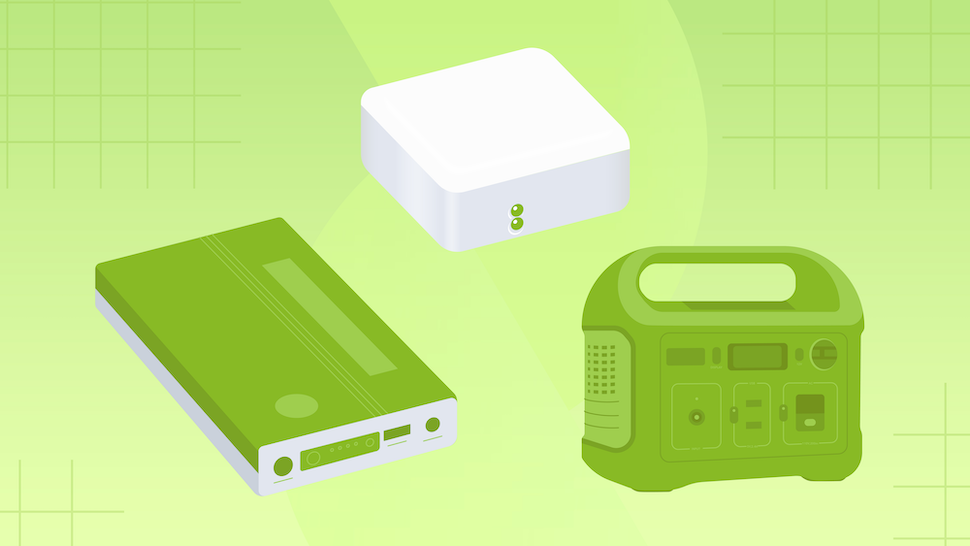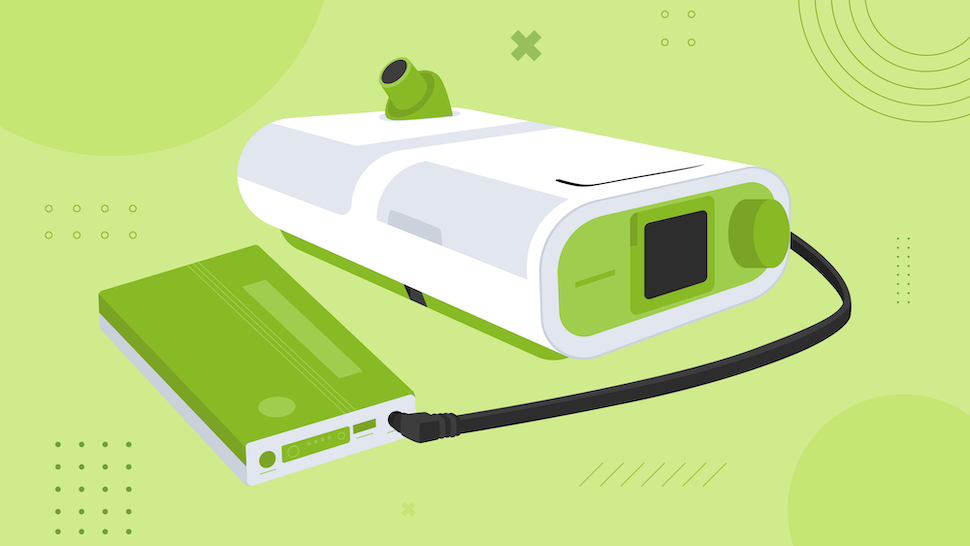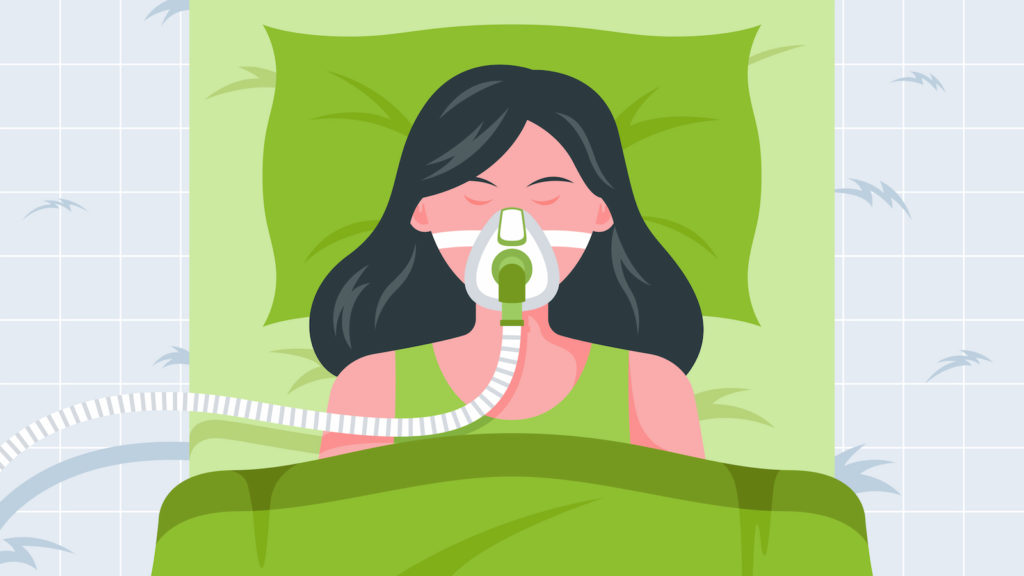CPAP batteries can offer outstanding flexibility and convenience but do so at a price.
Once you’ve adjusted to your PAP therapy, spending even one night without your CPAP machine could leave you feeling tired, achy, and otherwise uncomfortable.
This means most people with sleep apnea have to be hyperaware of where power sources are anytime they travel.
But what about times when power sources simply aren’t available–such as during a power outage or while camping?

In these cases, you might be able to use a travel CPAP machine with a built-in battery. But this often means keeping an entirely separate set of CPAP masks, power cables, CPAP tubing, and other accessories.
CPAP battery packs or CPAP battery backups allow you to use the same CPAP machine you already use anywhere you can find a dry place to set the battery and connect things!
In this guide, we’ll look at the types of CPAP batteries available and what you might consider when purchasing one.
What Are CPAP Batteries?
CPAP batteries work much like an external power bank you might use to charge your mobile phone or other electronics.
Most major manufacturers’ battery packs made for CPAP machines charge using a connection to a standard electrical outlet–though some might offer DC power adapters for charging using a power outlet in your vehicle.
Some larger packs by third-party manufacturers that aren’t explicitly designed for CPAP use allow additional charging methods–such as USB Type-C PD and solar panels.
How Do CPAP Batteries and Backups Work?
Regardless of the specific features available with your CPAP battery, most operate similarly.
You plug your CPAP machine into the battery instead of your power outlet, and it works as it normally would until the battery’s charge runs low.
The exact runtime for any CPAP battery will depend on your CPAP machine, pressure settings, humidifier use, and any accessories you might have which require power.

If you’re looking for protection from power outages, high-end batteries and backups might also offer power passthrough. Batteries with this feature essentially function as an uninterruptible power supply instead of a simple battery backup.
You can connect the battery to your charging source and your CPAP machine to the battery and enjoy uninterrupted use even if power should go out.
What You Should Consider When Shopping for CPAP Batteries
With the essentials of how these popular CPAP accessories work out of the way, we can start to explore why you might consider buying one.
By understanding how the various features available will impact both the cost of your CPAP battery or backup and how you’ll use it, you can get a clearer idea of what holds value to you.
This is particularly important as insurance programs do not typically cover or reimburse for CPAP battery purchases. So adding one to your setup could mean significant out-of-pocket spending.
Why Do You Need A Battery Backup?
This is, perhaps, the biggest question to consider as it will immediately start limiting your options.
If you’re planning to travel with your CPAP machine and you’re looking for a battery for off-grid use or use in transit, be sure to check for approval from any regulating groups, such as the FAA or TSA.
In many cases, larger battery backups or solar generators exceed the capacity limitations for checked baggage or on-flight carry-ons. This means arriving with one could mess up your plans.

Most batteries by CPAP manufacturers keep this in mind and offer lower-capacity batteries for safe use and simplified travel.
On the other hand, if you’re looking for a CPAP battery or backup to provide peace of mind if the power goes out at home, a larger model will offer greater convenience and a longer run time.
However, unless you choose a model with power passthrough, you’ll likely still need to switch your CPAP machine from your home power system to the battery or backup in the event of an outage or regularly recharge the battery system.
How Portable Do You Need Your Battery to Be?
Outside of whether you can take your CPAP battery or backup with you legally, you’ll also need to consider the convenience of doing so.
While you might be allowed to carry a 500 watt-hour solar generator around for short periods, you probably wouldn’t want to hike with it for kilometres to a remote campsite.

Likewise, if you do not intend to carry your battery around with you, a larger option can reduce the charge cycles required and provide peace of mind that your CPAP will operate through extended power outages.
Moreso, having a larger battery capacity could easily spell the difference between being able to last an entire night using popular, power-hungry comfort features such as heated humidifiers or heated CPAP tubing.
What Type of Connections Do You Need?
You can consider this question from two angles:
- What connections do you need to power your CPAP machine?
- What connections do you need to charge your CPAP battery?
Both are equally important to reliable use of a CPAP battery or backup.
In most cases, your CPAP machine will use AC power by default–often provided by your standard wall outlet. If your intended CPAP battery has a common connection for this, you’re good to go.
Sometimes battery backups will offer a DC power connection–like the one you likely have in your vehicle. If this is the only connection available, you might need an adapter for your CPAP machine to plug into your battery.
If your battery offers both, you might still consider picking up a DC power adapter for your CPAP machine as they typically allow you to get much longer runtimes out of your CPAP battery.
With the connections to your machine out of the way, all that is left is considering how you’d like to charge the battery between uses.
Most models will allow connection to a standard power outlet, and some allow charging using a DC power source.
However, if you want additional flexibility, some larger units allow you to charge using USB Type-C PD–the same connection used for many high-end mobile electronic devices and laptops.
Some solar generators and larger battery backups even allow charging via solar panels for extended off-grid use!
How Long Do You Need Your Battery to Run?
With the physical details covered, it’s time to look at the use and features.
One of the most obvious considerations here is runtime. Are you looking for an option to last the entire night (or even multiple nights) or just something for brief power outages?
Before purchasing, be sure to look at runtime estimates and consider that many estimates are made without additional CPAP amenities–such as heated tubing or heated humidifiers–enabled.
In many cases, a battery that might power a CPAP machine for multiple nights by itself will only provide a single night of use with a humidifier enabled and even less when used along with heated tubing.

In this situation, it’s important to consider the tradeoffs.
Longer running batteries mean more peace of mind, greater comfort, and reduced worries about keeping your battery topped off between rest periods.
On the other hand, extended runtime often increases price, weight, and travel complexity.
Finding an optimal balance between these factors will ensure a positive experience and help you to avoid overspending.
How Much Can You Afford to Pay?
Finally, with all of the features and compatibility factors considered, you can limit options based on price.
As mentioned earlier, insurance doesn’t typically cover CPAP battery purchases. So plan to pay for your battery out of pocket.
Also, consider the additional cost of any adapters or cables needed to use your CPAP battery to avoid any cost surprises and stay within your budget.
What About Travel CPAP Machines? Are They Better Than Batteries?
Suppose you’re considering a CPAP battery pack for travel use instead of using it at home to provide power redundancy. In that case, you might consider the benefits of a travel CPAP compared to purchasing a battery–especially because you’ll likely have to pay the total cost for either option yourself.
Some travel CPAP machines offer a built-in battery option for convenient travel use and offer a feature set that is more battery-friendly.
This means extended and more straightforward operation in a more portable format.

However, you must also consider the added cost to buy hoses, masks, filters, and other accessories for a second CPAP machine, as the accessories for the machine you use at home might not be compatible with your travel machine.
Travel CPAP machines aren’t inherently better than CPAP batteries (or vice versa.) Instead, it’s more of an alternative with unique benefits and concerns. For more on what to expect, be sure to check out our travel CPAP guide.
Summary
- CPAP batteries or CPAP backups provide access to your CPAP machine even when traditional power sources are unavailable.
- Common uses for CPAP batteries include travel and to protect against power outages.
- Batteries are available with AC, DC, USB Type-C PD, solar charging and more to provide flexibility in keeping your battery topped off and ready to go.
- Most batteries will allow you to use your existing connections to power your CPAP machine or include adapters for easy connection.
- For longer battery life, consider a battery with DC output options.
- Considering why you need your CPAP battery is a good starting point to finding the best option for you.
- Travel CPAP batteries will often provide greater portability at the expense of features and overall battery capacity.
- Larger batteries might provide greater runtime and more convenient use at home but might be more cumbersome when travelling.
- Manufacturer estimates are often a reliable indicator when determining how much battery life you need. However, these typically do not include humidifier or heated tube usage. If you use either of these, be sure to overestimate your battery needs.
- When considering costs, don’t forget to factor in any carrying cases, cables, or adapters you might need to make the most of your battery.
- Travel CPAP machines might be a viable alternative to CPAP batteries, depending on your use case and budget.
CPAP Supply is Canada’s leading online CPAP supply store in customer satisfaction. Our selection of CPAP batteries and power options from leading manufacturers provide flexible, reliable performance for many of today’s most popular CPAP machines. Browse our selection or contact us today to discuss options suited to your exact needs!
